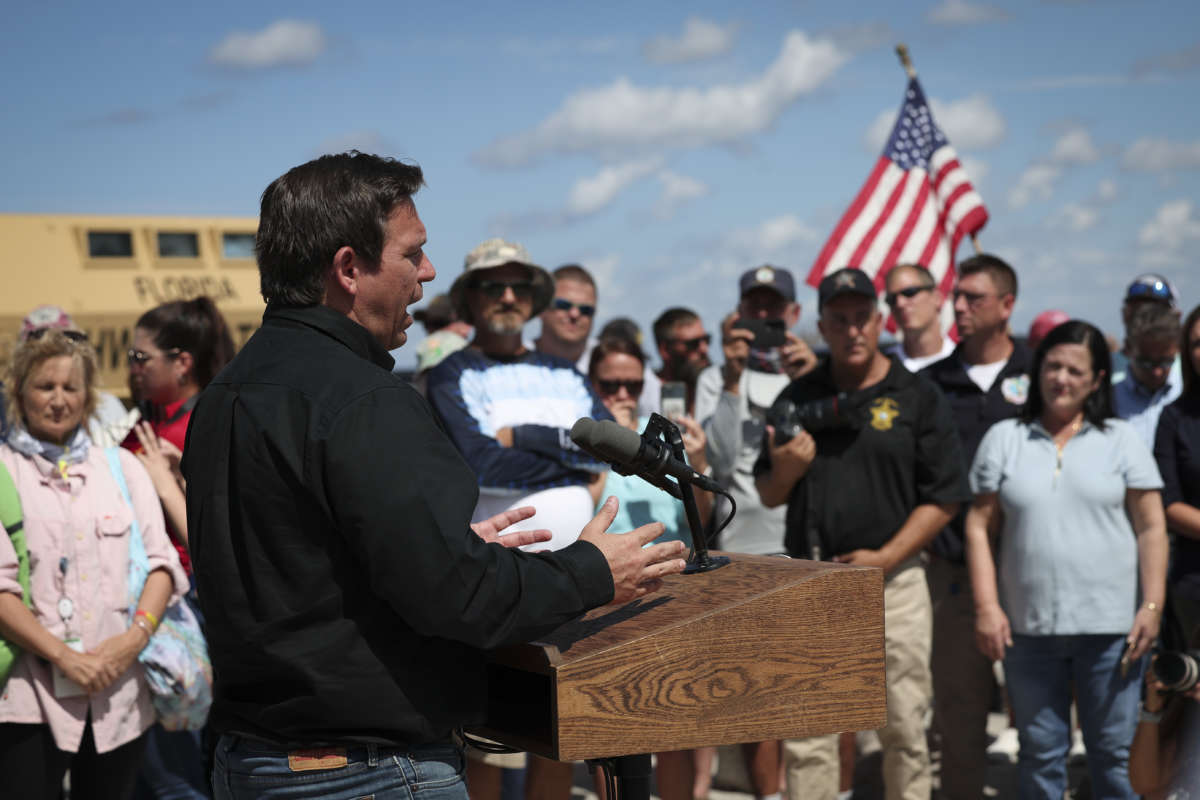In the wake of Hurricane Ian, we are seeing a lot of Florida Gov. Ron DeSantis in the media. We shouldn’t be confused: He is running for reelection and aspires to run for president. Anything he does in the aftermath of this disaster should be viewed as performative gamesmanship. Based on what we’ve seen, it is safe to say that his administration is about power and control. There is no reason to believe the devastating storms of this season will somehow lead to better treatment of the vulnerable. He has demonstrated a vindictiveness and cruelty that is more suited for a movie villain than a duly elected leader in a democracy.
In April 2022, MSNBC columnist Michael Cohen wrote of DeSantis, “Over the past several weeks in Florida, DeSantis has shown what a politician unmoored from fundamental democratic principles — and intent on waging political warfare — can achieve.” Cohen expressed those sentiments after DeSantis tossed out congressional lines that a bipartisan committee developed and drew his own. Advocates like me argued that DeSantis’s lines would make it harder for Black people to elect candidates of their choice.
But there have been a host of moments that have highlighted DeSantis’s true nature. For instance, he took steps — such as failing to mandate COVID-19 vaccines — that undermined the health and safety of children and education during a hellish pandemic. Most recently, his character was on display when he rounded up unsuspecting immigrants with promises of housing and jobs, and instead shipped them to a community in Massachusetts that was neither prepared to welcome them nor aware they were coming.
DeSantis has also revealed his true colors through his treatment of persons with felony convictions. After Floridians voted for a ballot initiative to enable returning citizens and people with felonies to vote, DeSantis immediately found a way to make it harder for returning citizens to exercise that right. Later, he and his acolytes began arresting said individuals when they attempted to participate in our nation’s democracy by registering to vote. Leading up to the August 9 primary, DeSantis’s election officials arrested 20 people for allegedly being ineligible to vote. After the Florida Rights Restoration’s constitutional amendment expanded access to the ballot for persons with felonies, many people who had been incarcerated believed that they’d have a true shot at participating in our nation’s democracy. The threat of being prosecuted for voting as a returning citizen will have a chilling effect on participation in future elections.
In a word, DeSantis has gone to great lengths to make life harder for people who do not look like him and people who do not vote like him. But at this moment, I am especially troubled that he and other Florida Republicans voted against or opposed disaster relief (some as recently as September 2022) even though the climate crisis is causing weather emergencies to occur with increased frequency and coastal communities like ours are especially vulnerable. And the trauma outlasts a news cycle. In Florida, the disasters have become deadlier and costlier, leading, in part, to increased housing costs, a dearth of affordable housing and rising homelessness. Being an elected leader means one must be a planner; DeSantis not only didn’t prepare but also appears to resent people who attempt to do so.
For those reasons and more, we should not be confused about who DeSantis is. He’s shown us time and time again. If he didn’t care about the most vulnerable in good times, why do we expect him to change now? Don’t let the plentiful media appearances fool you. There is no need to suggest that the storm is a make-or-break moment for this administration. It is already broken.
No one should be complicit in helping DeSantis overhaul his image. The same people who were vulnerable before Hurricane Ian — marginalized communities including people of color, people living in poverty, people with prior criminal records, women and children — remain vulnerable today. There is no other way to say it.
While I believe in redemption, no one is above accountability. Leaders who go out of their way to make others suffer should not get a pass. DeSantis should be evaluated with the same measure of grace he has given to others — and that is very little. But most importantly, we should not be fooled: He has shown us repeatedly who he is’
Media that fights fascism
Truthout is funded almost entirely by readers — that’s why we can speak truth to power and cut against the mainstream narrative. But independent journalists at Truthout face mounting political repression under Trump.
We rely on your support to survive McCarthyist censorship. Please make a tax-deductible one-time or monthly donation.
